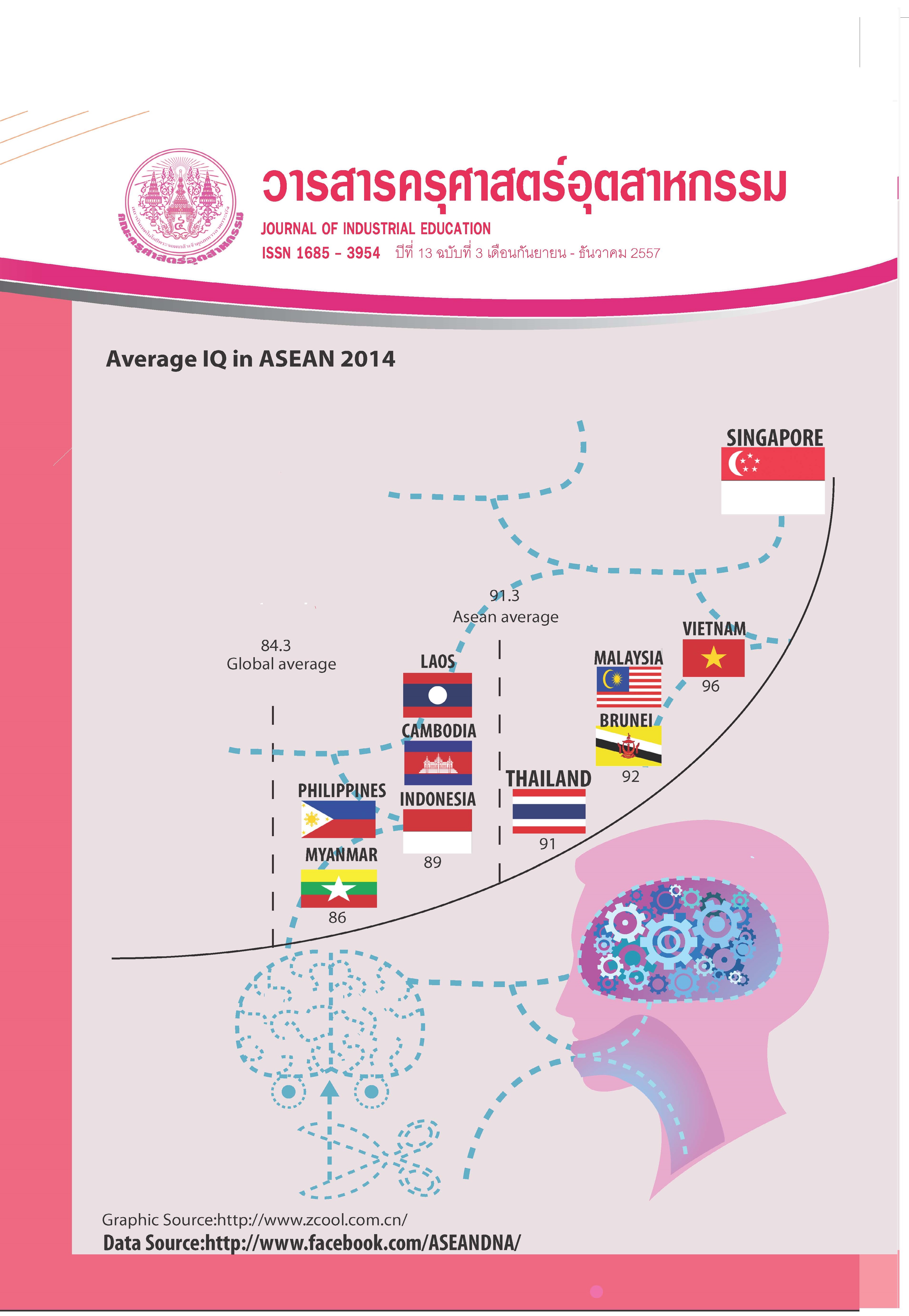A Study of Methodology for Integrate Cultural Capital with Design Education curriculum at Higher Education Level
Keywords:
instructional design, cultural capital, industrial Design, integrated learningAbstract
There were three objectives of this study : 1) Study methodology for Integrate Cultural Capital with Design Education curriculum at higher Education level 2) Study and develop the Instructional system integrate with Cultural Capital Model for Product Design Course in Design Education Curriculum, Bachelor’s degree study level 3) Study the student’s learning achievement and study lecturers and the students satisfaction from the Instructional Design integrate with Cultural Capital Model for Product Design Course in Design Education Curriculum, Bachelor’s degree study level. The samples were gathered from lecturers and bachelor’s degree students from Faculty of Industrial Education, King Mongkut’s Institute of Technology Ladkrabang. As a result, the Instructional system integrate with Cultural Capital Model for Product Design Course in Design Education Curriculum, Bachelor’s degree study level was conducted by the experimental research variables is a Instructional system integrate with Cultural Capital Model. Model for Product Design Course in Design Education Curriculum, Bachelor’s degree study level .This study evaluated the effectiveness of the model by the experts. A good level final evaluation Learning achievement and satisfaction.
The results were as follows :
1. The Study methodology for Integrate Cultural Capital with Design Education curriculum at higher Education level we found important assets of Thai Cultural Capital be compose of 9 Thai cultural heritage and 8 Thai folkways for use to developed Instructional system integrate with Cultural Capital Model
2. The developed Instructional system integrate with Cultural Capital Model for Product Design Course in Design Education Curriculum, Bachelor’s degree study level included the 3 steps as follows : 1) prepare and acceptation processes, 2) development and integrated with Cultural Capital for Industrial Product Design processes, and 3) evaluate students learning and satisfaction processes .The Instructional system integrate with TRIZ40 principles Model that have developed were evaluated by experts, which have resulted as high appropriate .
3. The Lecturers and student’s learning satisfaction from the Instructional system integrate with TRIZ40 principles Model for Product Design Course in Design Education Curriculum, Bachelor’s degree study level was measured as a high level ( =4.13) and Posttest of the student’s learning achievement through the developed Instructional system integrate with TRIZ40 principles Model with design education curriculum was higher than control group at .05 level of significance.
References
[2] วรากรณ์ สามโกเศศ. 2553. เอกสารประกอบการบรรยาย. เศรษฐกิจสร้างสรรค์จันทบุรี.สำนักงานคลังจังหวัดจันทบุรี.
[3] Bourdieu, Pierre. 1986. ‘The Forms of Capital’ in John Richardson (ed.) Handbook of Theory and Research for the Sociology of Education. New York: Greenwood Press.
[4] Csikszentmihalyi, Mihaly. 1999. Implications of a SystemsPerspective for the Study of Creativity in Robert Sternberg (ed) Handbook of Creativity. Cambridge. Cambridge University Press.
[5] Faul, F., Erdfelder, E., Buchner, A., & Lang,A.-G. 2009. Statistical power analyses using G*Power 3.1: Tests for correlation and regression analyses. Behavior Research Methods, 41, 1149-1160.
[6] นงลักษณ์ วิรัชชัย. 2555. การกำหนดขนาดตัวอย่างในการทดสอบสมมุติฐานวิจัย.เอกสารประกอบการบรรยาย เรื่อง “วิธีการที่ถูกต้องและทันสมัยในการกำหนดขนาดตัวอย่าง” ในโครงการ Research Zone จัดโดยศูนย์การเรียนรู้ทางการวิจัย ณ อาคารศูนย์การเรียนรู้ทางการวิจัยสำนักงานคณะกรรมการวิจัยแห่งชาติ (วช.) วันที่ 26 มกราคม 2555.
[7] ชาญชัย รอดเลิศ และ คณะ. 2554. การศึกษาและออกแบบสื่อการเรียนรู้งานศิลปหัตถกรรมปลาตะเพียนสาน. วารสารครุศาสตร์อุตสาหกรรม.10(3), น.54-63.
[8] ธัญญาภักดิ์ ธิเดช และคณะ. 2555.ศึกษาเอกลักษณ์ศิลปวัฒนธรรมล้านนา เพื่อประยุกต์ใช้ในการออกแบบงานเครื่องเรือน.วารสารครุศาสตร์อุตสาหกรรม. 11(1),น.208-219.
[9] อรุณี ปัญญสวัสดิ์สุทธิ์. 2554. ทุนทางวัฒนธรรมในแบบจำลองการเจริญเติบโตทางเศรษฐกิจ.การประชุมทางวิชาการของมหาวิทยาลัยเกษตรศาสตร์ ครั้งที่ 49, 1 กุมภาพันธ์ 2554, กรุงเทพมหานคร.
[10] ศูนย์ข้อมูลกลางทางวัฒนธรรม. 2556.9 มรดกทางวัฒนธรรม และ 8 วิถีชีวิตไทย.กระทรวงวัฒนธรรมออนไลน์.ค้นเมื่อวันที่ 11 สิงหาคม 2557,จากhttps://www.thaiculture.in.th/index
Downloads
Published
How to Cite
Issue
Section
License
"The opinions and contents including the words in papers are responsibility by the authors."
"ข้อคิดเห็น เนื้อหา รวมทั้งการใช้ภาษาในบทความถือเป็นความรับผิดชอบของผู้เขียน"



